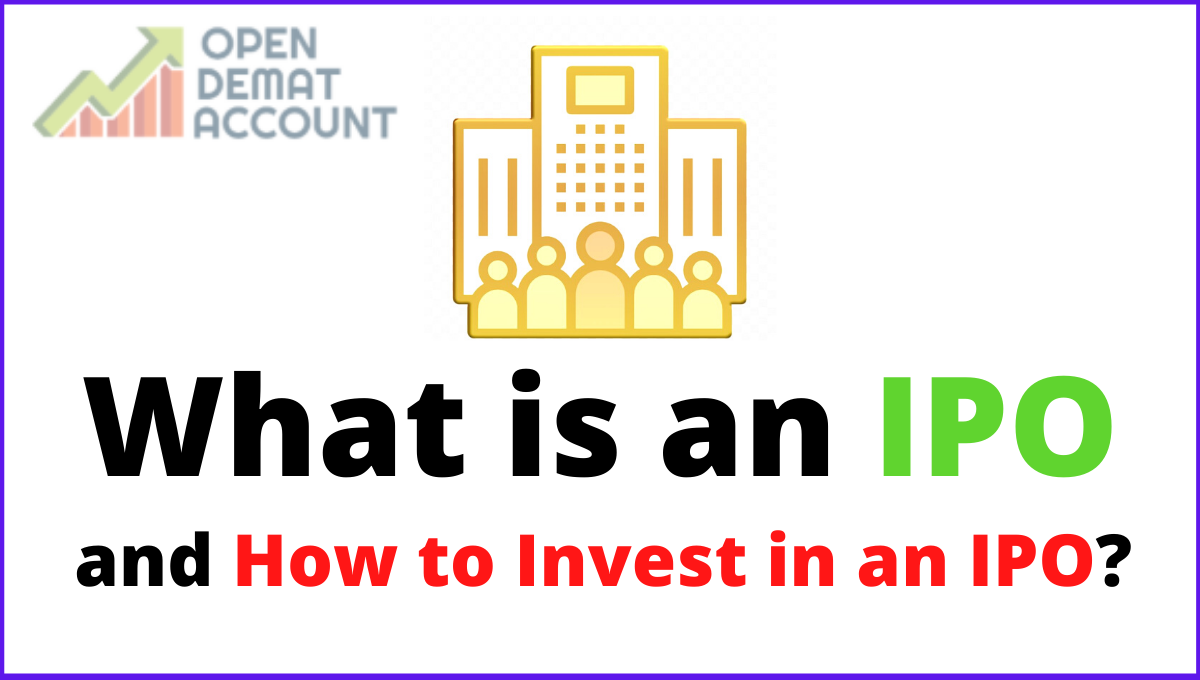What is IPO? IPO Full form?
Table of Contents
IPO Full form is Initial Public Offering. IPO provides an opportunity for a private company to directly sell their shares to the general public for the first time. It can be a new or old company that decides to be listed on the stock exchange.
Companies can boost their investment capital with the help of an IPO by issuing new shares to the public or the current shareholders can sell their shares to the public without asking for any fresh capital.
Types of IPO?
There are generally two types of IPO. They are
Fixed Price IPO
The issue price which some companies set for the initial sale of their shares is Fixed Price IPO. Here, an investor comes to know about the price of the stocks that the company pledges to make public.
The demand for the shares in the market can be revealed once the issue is closed. If the investors participate in this IPO, they must assure that they pay the full price of the shares while making the application.
Book Building IPO
In the book building IPO, the company launching an IPO offers a 20% price band on the stocks to the investors. The investors bid on the shares before the final price is decided.
The investors need to define the number of shares they expect to buy and the amount they are prepared to pay per share. The lowest share price is known as a floor price and the highest stock price is known as cap price.
What is IPO Allotment?
An IPO allotment is a process in which the “registrar to the offer” finalizes the process of allocating the IPO shares by a lottery system to the person who has applied for IPO. The IPO allotment process usually takes place within 1 week on the IPO release date for all Large-Cap IPOs.
For SME IPOs, it takes time only in a few cases where the subscription is not met up to particular inception or for a few other reasons. But the allotment status is out within 1 week in most of the cases.
What is a Fresh Issue?
A fresh issue refers to a share that has been registered, issued, and is being sold on a market to the public for the first time. The name does not certainly refer to newly issued stocks, although initial public offerings (IPOs) are the most generally known new issues. The shares that can be newly issued involve both debt and equity.
What is an Ipo Price Band?
A price band is a value-setting process in which a seller shows an upper and lower cost limit, between which buyers are capable to place bids. This type of auction pricing method is usually used with initial public offerings (IPOs).
The price band and the minimum bid lot of an IPO are chosen by the promoters or selling shareholders of a company in consultation with the book running lead managers.
What is a Market Lot size & Minimum Order Quantity?
IPO Market Lot and Minimum Order Quantity are two major factors that an investor should know while bidding for an IPO.
The Minimum Order Quantity is the minimum number of shares an investor can apply while bidding in an IPO. If an investor wants to bid for more shares, then they can apply in multiples of the IPO market lot (lot Size or IPO bid lot) of shares.
What is Face Value in an IPO?
The face value is also known as the par value, it is the nominal value of the shares. The face value is either Re 1, Rs 2, Rs 5 or even Rs 100. There have been IPOs that have set the price band near the face value of the shares, which indicates the company tried minimal premium.
What is ASBA mode of payment for IPO?
SEBI introduced ASBA (Application Supported by Blocked Amount) for retail investors. The ASBA system assured that the applicant’s money remains in his/her bank account until the shares are allotted to them. It has been extended to corporate investors and HNIs as well.
The mechanism needs the applicant to give permission to block his/her application money in the bank account for subscribing to the IPO. His/her bank account is debited only after the allotment is finalized, or the IPO is withdrawn or fails.
How does a company offer IPO?
A company hires an investment bank to handle the IPO before it becomes public. The investment bank and the company together work on the financial details of the IPO.
They file the registration statement with the SEC(Securities and Exchange Commission). SEC examines the disclosed information and if found right, it allows a date to announce the IPO.
Why does a company offer an IPO?
- Every company needs money to expand or to improve its business or to renovate the infrastructure or to repay loans, etc. Offering an IPO is actually a money-making exercise for a company.
- A company going public means that the brand has gained ample success to get its name reflected in the stock exchanges. It is a matter of trustworthiness and pride of any company.
- In the stock market, a company can always issue more stocks. This will cover the way to acquiring and organisations as the stocks can be issued as a part of the deal.
How to invest in IPO?
The most essential thing you need to have before you apply for IPO is the demat account. As the shares will get credited to your demat account after allotted to you under the IPO investment process.
If you don’t have a Demat Account then you can open with any SEBI registered top discount brokers like Zerodha Demat Account & Upstox Demat Account. You can buy IPO shares through these brokers. You need to download the IPO application form from their website, fill the form and submit to the broker.
How to buy IPO shares online
You can buy IPO shares online by applying for it through certain stock Brokers. ASBA (Application Supported by Blocked Amount) procedure is used in case of payment.
Your IPO application money remains blocked in your bank account until the allotment is finalized. If no IPO shares are allotted to you, then the particular amount that was blocked will be released.
Should you invest in IPO?
Making a decision about whether to invest your money into an IPO of a comparatively new company is really difficult. Here are the few points by which helps you to decide whether to invest in IPO or not?
Check Company’s Background
The Company does not have enough historical data to back your decision, because it is about to go public. The deviation is the data on the IPO details which is provided in the plan, you need to examine it. You must know about the fund management team and their plans for IPO generated fund utilization.
Underwriting Process
The process of underwriting is increasing investments by allotting new shares. They may underwrite any company. An IPO with a success potential is supported by big brokerages that have the ability to recommend a new issue properly.
Lockup periods
Usually, IPO takes a deep downtrend after the IPO goes public. The reason behind this fall of the share price is the lockup period. It is a contractual sign which refers to a period of time in which the company’s executives and investors are not supposed to sell their shares. The share price undergoes a drop in its price after the lock-up period ends.
Eligibility criteria to invest in an IPO
There are some other necessary measures an investor needs to check before investing in an IPO. The eligibility criteria are:
- It is required that the investor interested to buy a share in an IPO has a PAN card issued by the Income Tax department of the country.
- You also need to have a valid demat account. A demat account helps you to keep the shares in which you have invested. In case an investor sells the stocks on listings, he will need a trading account.
- It is recommended to open a trading account along with the demat account when an investor is looking forward to investing in an IPO for the first time.
Points to remember before investing in an IPO
- If you have bought an IPO for the company, you are exhibited to the wealth of that company. You have a direct bearing on its success and loss.
- You get the highest potential to reward the returns and also can sink your investment without a sign as stocks are subjected to the volatility of the markets.
- You should remember that a company which offers its shares to the public is not responsible to pay the money to the public investors.
Conclusion
Initial Public Offerings are usually considered useful as it allows the issuer company to expand its equity base and increases exposure and fame.
It provides investors with an opportunity to gain good returns. You must be careful of the latest IPOs and have a clear knowledge of analysing financial metrics in order to identify the opportunities.
FAQs
Open Demat Account
Broker | Rating | Link to Open | |
|---|---|---|---|
Zerodha No.1 Stock Broker in India | ★★★★★ | ||
Upstox | ★★★★ | ||
Angel Broking | ★★★★ | ||
5 Paisa | ★★★★ | ||
StoxKart | ★★★★ |










Leave a Reply